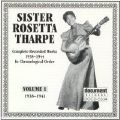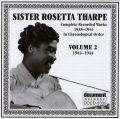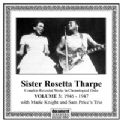Sister Rosetta Tharpe CDs
Document Records have 3 Sister Rosetta Tharpe CDs in it's back catalogue. If you wish to buy the Sister Rosetta Tharpe CDs please click the links below.
The Sister Rosetta Tharpe song "What Is The Soul Of Man" has been re-mixed for the new Alfa Romeo car advert and the original track can be found on Volume 2 (DOCD-5335).
Sister Rosetta Tharpe Volume 1 1938-1941
Sister Rosetta Tharpe Volume 2 1942-1944
Sister Rosetta Tharpe Volume 3 1946-1947
Sister Rosetta Tharpe
Sister Rosetta Tharpe was born Rosetta Nubin, in Cotton Plant,
In 1934 she met and married Pastor Thorp, who was an Elder in the
Rosetta’s first recordings were released less than two months before the Carnegie concert and on them she displayed her own particular open tuning in B-flat. This session was followed up with another in January 1939 which included her first recorded version of the song "This Train". 1939 was to be a busy year for Sister Rosetta. The Cotton Club kept her for there next show that featured Bill Robinson. The show went on to run through the summer with Rosetta performing alongside Andy Kirk's Band which featured Mary Lou Williams on piano. Her popularity reached new heights when Life magazine ran a feature story on her.
She next recorded in 1941, where she played another popular tune in her reportoire, "Stand By Me". During this year she also recorded the songs "Trouble In Mind", a blues standard, and the swinging spiritual "Rock Daniel" and starred in 3 short films with the Lucky Millinder Orchestra. During this time she continued to play with Cab Calloway's band at the Apollo Theatre and became somewhat of a smash. Later in the same year she recorded again with the Lucky Millinder Orchestra, producing the songs "Rock Me" and "That's All", this time on electric guitar.
During the later years of World War II, Rosetta was so popular that she was one of only two black gospel acts - the other being the Golden Gate Quartet - to record V-Discs for American soldiers overseas. She also toured in the company of the Dixie Hummingbirds, among others. In 1944, she began recording with boogie-woogie pianist Sammy Price; their first collaboration, "Strange Things Happening Every Day".
In 1946 she teamed with the Newark-based Sanctified shouter Madame Marie Knight, whose simple, unaffected vocals made her the perfect counter point for Tharpe's theatric stage presence; the duo's first single, "Up Above My Head," was a huge hit, and over the next few years they played to tremendous crowds across the church circuit.
In the early 50s Tharpe and Knight teamed up again to record a handful of straight blues numbers. This did not go down well with the fans. Knight tried to make a permanent leap into secular music, but to little success and Tharpe remained a Gospel artist although due to the recording of the blues numbers, her credibility with her fan base was seriously damaged. Record sales dropped and live concerts became fewer and in the end she journeyed to
Eventually after a slow but steady rehabilitation she appeared again at the Apollo Cub in 1960 with the Caravans and James Cleveland. Although not as popular as in her 40s heyday she continued to tour throughout the 60s and into the early seventies. She died in
http://en.wikipedia.org/wiki/Sister_Rosetta_Tharpe
From Wikipedia, the free encyclopedia
http://home.earthlink.net/~jaymar41/rosetta.html
more Sister Rosetta
http://university.imdb.com/title/tt0450250/
Blues and Gospel Train, a film by John Hamp which starred Sister Rosetta Tharpe amongst others.
http://home.earthlink.net/~jaymar41/rosetta.html
Sister Rosetta Tharpe biog and discography


